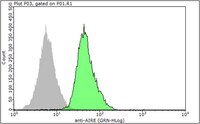Neonatal tolerance revisited: a perinatal window for Aire control of autoimmunity.
Guerau-de-Arellano, Mireia, et al.
J. Exp. Med., 206: 1245-52 (2009)
2009
Pokaż streszczenie
There has long been conceptual and experimental support for, but also challenges to, the notion that the initial period of the immune system's development is particularly important for the establishment of tolerance to self. The display of self-antigens by thymic epithelial cells is key to inducing tolerance in the T lymphocyte compartment, a process enhanced by the Aire transcription factor. Using a doxycycline-regulated transgene to target Aire expression to the thymic epithelium, complementing the Aire knockout in a temporally controlled manner, we find that Aire is essential in the perinatal period to prevent the multiorgan autoimmunity that is typical of Aire deficiency. Surprisingly, Aire could be shut down soon thereafter and remain off for long periods, with few deleterious consequences. The lymphopenic state present in neonates was a factor in this dichotomy because inducing lymphopenia during Aire turnoff in adults recreated the disease, which, conversely, could be ameliorated by supplementing neonates with adult lymphocytes. In short, Aire expression during the perinatal period is both necessary and sufficient to induce long-lasting tolerance and avoid autoimmunity. Aire-controlled mechanisms of central tolerance are largely dispensable in the adult, as a previously tolerized T cell pool can buffer newly generated autoreactive T cells that might emerge. | 19487417
 |
A specific anti-Aire antibody reveals aire expression is restricted to medullary thymic epithelial cells and not expressed in periphery.
Hubert, François-Xavier, et al.
J. Immunol., 180: 3824-32 (2008)
2008
Pokaż streszczenie
Autoimmune polyendocrinopathy-candidiasis-ectodermal dystrophy is an autoimmune disorder caused by mutations in the autoimmune regulator gene AIRE. We examined the expression of Aire in different organs (thymus, spleen, and lymph nodes) in C57BL/6 mice, using a novel rat mAb, specific for murine Aire. Using flow cytometry, directly fluorochrome-labeled mAb revealed Aire expression in a rare thymic cellular subset that was CD45(-), expressed low levels of Ly51, and was high for MHC-II and EpCam. This subset also expressed a specific pattern of costimulatory molecules, including CD40, CD80, and PD-L1. Immunohistochemical analysis revealed that Aire(+) cells were specifically localized to the thymus or, more precisely, to the cortico-medulla junction and medulla, correlating with the site of negative selection. Although in agreement with previous studies, low levels of Aire mRNA was detected in all dendritic cell subtypes however lacZ staining, immunohistochemistry and flow cytometry failed to detect Aire protein. At a cellular level, Aire was expressed in perinuclear speckles within the nucleus. This report provides the first detailed analysis of Aire protein expression, highlighting the precise location at both the tissue and cellular level. | 18322189
 |









